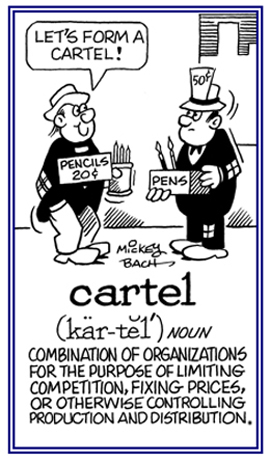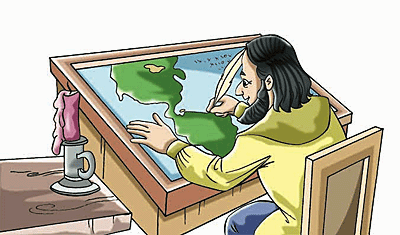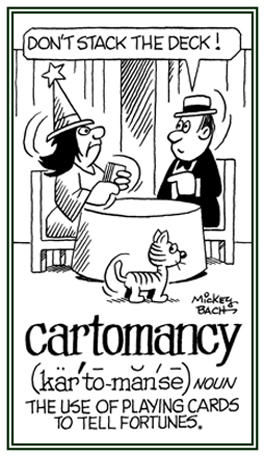cartel
(s) (noun), cartels
(pl)
1. An association of independent organizations formed to limit competition by controlling the production and distribution of products or services: Different companies joined together in a
cartel to restrict the supply of their goods in order to keep the prices at a higher level.
While a cartel is usually a group of business representatives from independent companies, the term can also refer to a coalition of politicians who are united for what their voters want to be achieved.
2. Etymology: "a written challenge", from Middle French
cartel; from Italian
cartello, diminutive of
carta, "card". It came to mean "written agreement between challengers" in about 1692.
 © ALL rights are reserved.
© ALL rights are reserved.
cartogram
A type of single-topic map which is not made with a constant scale, in which features are deliberately distorted to show their relative value to one another in terms of that single topic; for example, a map in which states, or countries, are made large or small according to their agricultural production.
cartogramic
A reference to a map showing geographically, by shades or curves, statistics of various kinds; related to a statistical map.
cartograph
(s) (noun), cartographs
(pl)
A map showing the geographical locations of places; such as cities, villages, or even individuals.
cartographer
(s) (noun), cartographers
(pl)
Someone who makes or compiles charts or maps.

cartographic
(adjective), more cartographic, most cartographic
1. Relating to the tools and techniques of surveying land surfaces for the purposes of making maps, or the graphic tools and techniques used to produce maps.
2. A reference to the science, skill, or work of making maps.
cartographic license
(s) (noun), cartographic licenses
(pl)
The freedom to adjust, add, or omit features on a map, within stated allowable limits, to obtain the best cartographic expressions.
cartographic satellite
(s) (noun), cartographic satellites
(pl)
An artificial satellite in space that is designed to take photographs and collect data used in preparing maps of the earth's surface.
cartography
(s) (noun), cartographies
(pl)
1. The science, skill, or work of making maps.
2. The art or technique of making maps or charts.
3. Etymology: from French
cartographie, from Middle Latin
carta, "paper".
Maps are graphic simplifications of reality, portraying relationships on the surface of the earth, or other celestial bodies, with points, lines, areas, symbols, colors, and typography.
Some maps are charts that display data specifically for nautical and aeronautical navigation. A map can be either two-dimensional or three-dimensional.
cartology
A method of coal-seam correlation which involves the mapping and drawing of both vertical and horizontal sections.
cartomancy
(s) (noun) (no pl)
Prophecy or fortune telling using printed cards which are used in gambling or games: The system of
cartomancy includes modern packs of cards and even special divination cards that have been produced for this purpose.
Cartomancy is said to originate with gypsies who prognosticated the future and provided guidance as to how to reveal the personality traits of people.
 © ALL rights are reserved.
© ALL rights are reserved.
Go to this Word A Day Revisited Index
so you can see more of Mickey Bach's cartoons.
cartometric scaling
The accurate measurement of geographic or grid coordinates on a map or chart by means of a scale.
carton
1. A cardboard box in which something; such as, merchandise, movable property, or mail is packaged.
2. A plastic or cardboard container, or a container made of plastic or waxed cardboard in which food or drink is sold.
3. Etymology: from French carton, "pasteboard"; from Italian cartone, "pasteboard"; from Middle Latin carta, "paper". Originally the material for making paper boxes; extended in 1906 to the boxes themselves.
cartoon
1. A drawing depicting a humorous situation, often accompanied by a caption.
2. A drawing representing current public figures or issues symbolically and often satirically; such as, a political cartoon.
3. An animated cartoon.
4. A comic strip.
5. Etymology: from French
carton; from Italian
cartone, "strong, heavy paper, pasteboard"; thus, "preliminary sketches made by artists on such paper"; from Middle Latin
carta, "paper".
An extension to comical drawings in newspapers and magazines came in 1843. Cartoonist was first recorded in 1880.
cartophile, cartophilist
(s) (noun); cartophiles; cartophilists
(pl)
A collector of cigarette cards: In Sam's neighborhood there were many cartophilists, all collecting the little cards that came with their packs of cigarettes. Each card had a text and picture on it and were distributed in sets with different topics.




